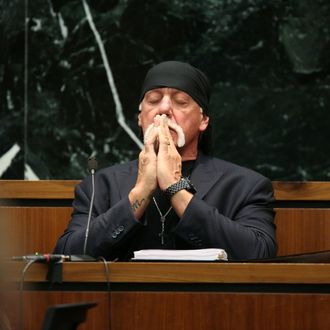
Hulk Hogan’s lawsuit against Gawker Media — currently captivating an audience of thousands of bloggers and wrestling fans — is body-slamming its way through a Florida courtroom. On Wednesday, Hogan’s lawyers played video of former Gawker editor A.J. Daulerio’s 2013 deposition, which, among other things, taught a valuable lesson in the correct venues for sarcasm. Today, Gawker’s lawyer is cross-examining one of Hogan’s expert witnesses, University of Florida journalism professor Mike Foley, in the process teaching his own lesson on the value of a University of Florida journalism degree.
The background, in case your “Hulk Hogan” Google alerts have not been delivering, is this: In 2012, Gawker, a news and gossip blog, published a video featuring excerpts from a sex tape featuring Hogan (real name Terry Bollea) and the wife of a friend. Hogan sued the company (and Daulerio), and the lawsuit is now playing out in front of a Florida jury. Earlier this week, Hogan himself testified in a bold attempt to limn the distinction between Terry Bollea and Hulk Hogan. Yesterday and today have mostly been about Daulerio and Denton’s pretaped depositions and the testimony of expert Foley. Read on to have all of your questions answered.
Did a Gawker editor say something very stupid?
Yes. In a deposition taped in 2013, Daulerio, who wrote the post in question, was asked about hypothetical limits to Gawker’s sex-tape coverage.
Q. Well, can you imagine a situation where a celebrity sex tape would not be newsworthy?
A. If they were a child.
Q. Under what age?
A. Four.
Did a Gawker editor say he’d publish sex tapes featuring children?
Straight-up: No.
If you watch the tape, it’s very clear that Daulerio is giving a petulant response to a silly question. But, of course, petulance, sarcasm, irony, and flippancy, as charming as those moods might be when adopted by bloggers, definitively do not translate in sworn depositions. That final answer, “Four,” was interpreted oddly seriously by some — including the New York Times, which implied that Daulerio was assenting to the hypothetical publication of sex tapes featuring children ages 5 and up.
Gawker’s spokesperson clarified in a statement that the second part of the exchange was sarcastic: “He’d just said in the prior answer that he wouldn’t post a tape of a child and when the question was repeated he obviously made the point in a flip way because his answer was already clear.” But, of course, none of this matters: Daulerio’s response may not have been evil, strictly speaking, but it was very, very stupid.
Okay, that’s cleared up. But did any other Gawker witnesses say stupid and incorrect things?
Oh, for sure. Here’s Gawker head honcho Nick Denton in another taped deposition:
Denton — more practiced in his defense of tabloid journalism and gossip as noble pursuits — also gave a crash course in digital media, explaining phrases like “page view metrics” and “traffic whoring,” the latter of which he described as “gratuitous” and likened to “empty calories.”
Surely there was some expert on hand to rebut Denton’s testimony.
I mean, define expert. Hogan’s team is employing a University of Florida journalism professor named Mike Foley to testify on their behalf (and compensating him handsomely to do so).
The thrust of Foley’s testimony on Wednesday was that Gawker had behaved unethically, published non-newsworthy material, and failed to pass the “Cheerios test.” In particular, Foley and Hogan’s lawyers harped on Gawker’s apparent violations of the Society of Professional Journalists’ Code of Ethics. The problem with this line of argument is that it conflates those ethical guidelines with legal guidelines, which they are decidedly not.
Nevertheless, Foley marched on: “You don’t want to invade someone’s privacy for example, without a good reason,” Foley told the court. Clearly, his definition of “good reason” differs from Gawker’s, and that’s what the trial comes down to. Was Gawker’s post newsworthy and, therefore, justifiable to publish?
Today, by most accounts, Foley is getting torched in cross-examination. He confirmed that he has not worked as a reporter in more than four decades and left the Tampa Bay Times before they had even begun to establish a web presence.
What is the, uh, “Cheerios test”?
Foley’s whole testimony centers on something referred to as “the Cheerios test,” which asks, “Would you want your readers to see this at breakfast, first thing in the morning?”
Gawker’s cross-examination today aims to dismiss the assertion that there is a single smell or, I guess, breakfast test that can be applied to every news story, and that different publications have different readerships.
The other argument Gawker is rolling out is that Foley doesn’t understand the difference between straight news and commentary, arguing that the Hogan post was in the latter. In that sense, the post had news value but was not presented as simple reporting.
Who’s going to win?
For months now, legal experts have been predicting a victory for Hogan. Even Gawker’s president (a lawyer herself), Heather Deitrick, has admitted that putting New York gossipmongers on the stand in front of a St. Petersburg jury to defend the publication of a sex tape featuring a local hero means that it’s “more than likely” Gawker will lose.
On the other hand, Gawker will almost certainly win on appeal — federal judges generally give publishers a wide berth, and the company has won several appeals it’s already filed over the last three years. So the question for Gawker’s future is: How big a judgment will the jury award? The lawsuit is requesting $100 million, a figure that — were Gawker forced to post bond, which Florida law would require — could wipe the company out. But there’s a good chance the suit could end in a small award for Hogan, which the company might not even bother to appeal.





























